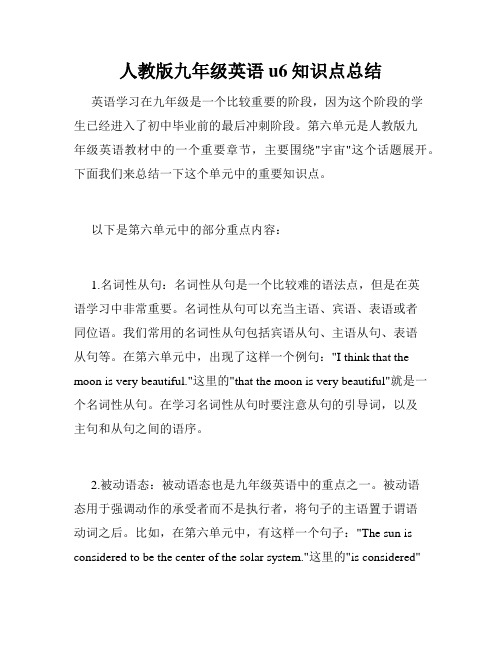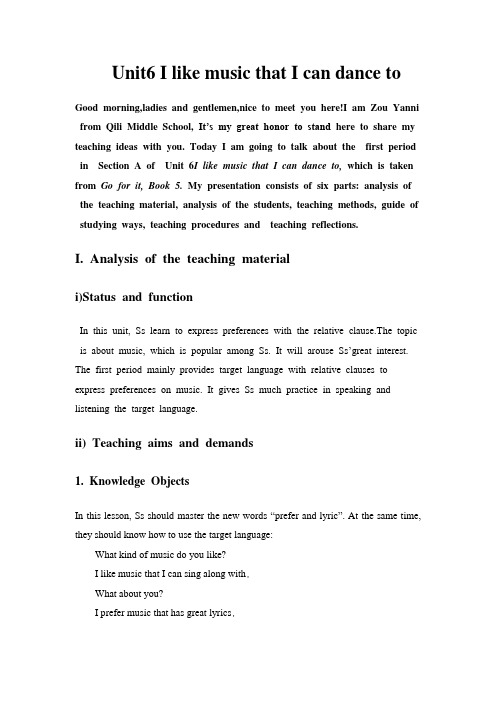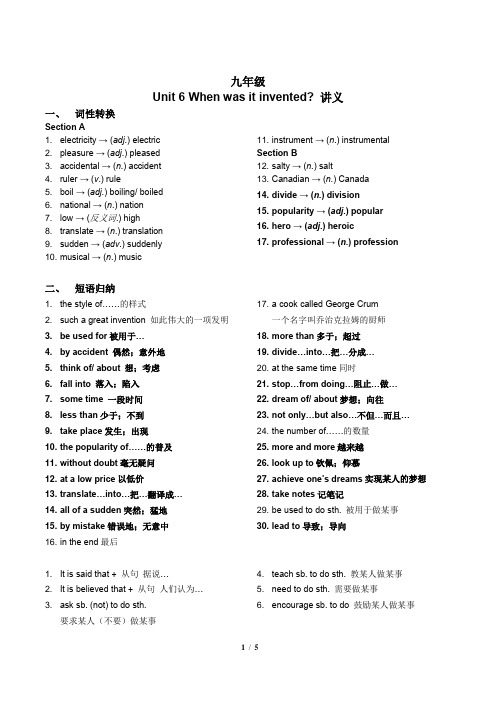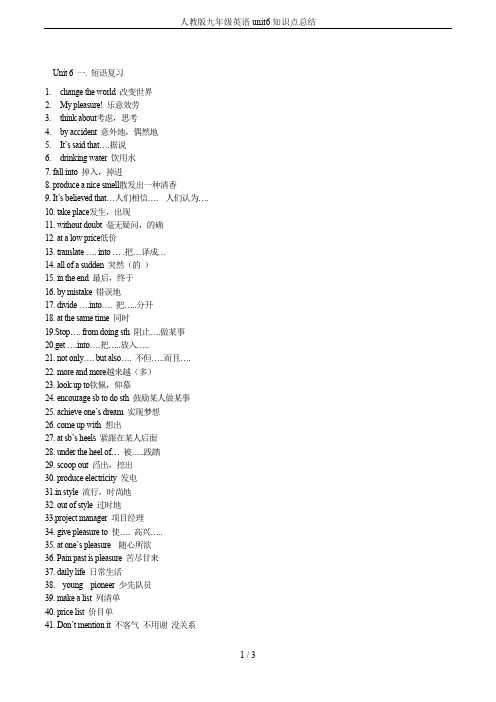人教版英语初三第六单元知识点总结说课材料
人教版九年级英语Unit6SectionA(3a3c)说课稿

3.为下一节课的学习做好铺垫,提高课堂学习效果。
五、板书设计与教学反思
(一)板书设计
我的板书设计将采用清晰的布局、简洁的内容和直观的风格。板书左侧列出本节课的主要词汇,如音乐类型词汇;右侧则展示本节课的重要语法点,如一般现在时的句子结构。中间部分则用于记录听力材料的关键信息和课堂讨论的要点。
人教版九年级英语Unit6SectionA(3a3c)说课稿
一、教材分析
(一)内容概述
本节课为人教版九年级英语Unit 6 "Can you sing English songs?"的Section A(3a-3c)部分。在整个课程体系中,本单元主要围绕音乐这一主题展开,让学生在掌握相关英语表达的同时,培养他们对音乐的兴趣和爱好。本节课的内容旨在让学生通过听力、阅读和口语练习,掌握如何用英语谈论音乐类型、喜好以及简单的音乐活动。
(三)互动方式
为促进学生的参与和合作,我计划设计以下师生互动和生生互动环节:
1.师生互动:通过提问、示范、指导等方式,与学生进行互动,引导他们积极参与课堂活动。同时,关注学生的个体差异,给予个性化鼓励和指导。
2.生生互动:
a.小组讨论:让学生在小组内讨论音乐喜好、分享音乐故事,提高他们的口语表达能力。
2.结合真实语境,展示一般现在时在音乐活动中的运用,如句子:“He listens to jazz every day.”,引导学生理解并模仿。
3.播放听力材料,让学生完成相应的练习,提高听力技巧。
(三)巩固练习
为了帮助学生巩固所学知识并提升应用能力,我计划设计以下巩固练习或实践活动:
1.小组活动:让学生分组讨论,分享自己的音乐喜好,并用一般现在时进行表达。
人教版九年级英语u6知识点总结

人教版九年级英语u6知识点总结英语学习在九年级是一个比较重要的阶段,因为这个阶段的学生已经进入了初中毕业前的最后冲刺阶段。
第六单元是人教版九年级英语教材中的一个重要章节,主要围绕"宇宙"这个话题展开。
下面我们来总结一下这个单元中的重要知识点。
以下是第六单元中的部分重点内容:1.名词性从句:名词性从句是一个比较难的语法点,但是在英语学习中非常重要。
名词性从句可以充当主语、宾语、表语或者同位语。
我们常用的名词性从句包括宾语从句、主语从句、表语从句等。
在第六单元中,出现了这样一个例句:"I think that the moon is very beautiful."这里的"that the moon is very beautiful"就是一个名词性从句。
在学习名词性从句时要注意从句的引导词,以及主句和从句之间的语序。
2.被动语态:被动语态也是九年级英语中的重点之一。
被动语态用于强调动作的承受者而不是执行者,将句子的主语置于谓语动词之后。
比如,在第六单元中,有这样一个句子:"The sun is considered to be the center of the solar system."这里的"is considered"就是被动语态的用法。
在学习被动语态时,要注意被动语态的构成和使用条件。
3.连词和短语:在九年级英语中,连词和短语的运用也是一个重要的知识点。
在第六单元中,我们学习到了一些表示转折关系的连词,比如"but"、"however"等。
我们还学习到了一些表示目的、原因和结果的连词和短语,比如"so that"、"because of"等。
这些连词和短语的正确运用可以使我们的表达更加准确和连贯。
4.宇宙知识:第六单元的主题是宇宙,所以在学习过程中我们也学到了一些宇宙知识。
人教版九年级英语unit6英文版说课稿

Unit6 I like music that I can dance toGood morning,ladies and gentlemen,nice to meet you here!I am Zou Yanni from Qili Middle School, It’s my great honor to stand here to share my teaching ideas with you. Today I am going to talk about the first period in Section A of Unit 6I like music that I can dance to,which is taken from Go for it, Book 5.My presentation consists of six parts: analysis of the teaching material, analysis of the students, teaching methods, guide of studying ways, teaching procedures and teaching reflections.I. Analysis of the teaching materiali)Status and functionIn this unit, Ss learn to express preferences with the relative clause.The topic is about music, which is popular among Ss. It will arouse Ss’great interest. The first period mainly provides target language with relative clauses to express preferences on music. It gives Ss much practice in speaking and listening the target language.ii) Teaching aims and demands1. Knowledge ObjectsIn this lesson, Ss should master the new words “prefer and lyric”. At the same time, they should know how to use the target language:What kind of music do you like?I like music that I can sing along with.What about you?I prefer music that has great lyrics.2. Ability ObjectsIn this lesson, I’ll mainly train th e Ss listening and speaking abilities and develop the Ss’ abilities of communication by express -ing their preferences on music.3. Moral ObjectsLet’s enjoy music.It always brings us happiness.4.Teaching keys and difficultiesTeaching Key Points1).Key V ocabulary prefer, lyric2).Target LanguageTeaching Difficult Points1).Relative clauses with that2).The listening practice5.Teaching aidsA tape recorder and a computerII.Analysis of the studentsThe Ss have learned English for two and a half years, they can express their thought and communicate with each other with English well. And all the Ss will be interested in the topic, which is related to their real life.. It’s helpful for our study of this lesson.III.Teaching methodsIn this lesson, I’ll mainly use the following teaching method s:1.Chain drill2.Pairwork3. Task-based teaching methodIV.Guide of studying waysIn order to guide the Ss better, develop the Ss’ abilities, in this lesson, the Ss will learn how to be a good language learner, and how to communicatewith others. It will be very helpful for their learn-ing in the future. I think good studying ways can help the Ss to be good language learners.V.Teaching proceduresStep1. Revision(1)Invite different pairs of students to say the conversations learned in preceding classes with books closed.(2)Check the answers to the exercises of the workbook by asking different students to say their answers to the Class.(3)Dictate some of the key vocabulary words presented in units 1-5.Purpose of my designing: I think it is important to review the knowledge we have learned.Step 2 PresentationWrite“that are red ”on the blackboard.Point to it and say a sentence with it, I like flowers that are red.Ask who can make another sentence with it.They may say, I like gloves that are red.I like shoes that are red.Write another phrase on the blackboard, …that is big.Help the students tomake sentences with it.Play the tapes of different kinds of music for the students, only a short piece of each tape.Say, I like music that makes me relaxed.Write these four groups of words on the blackboard,…that has great lyrics,…that I can sing along with,…that isn’t too loud, …that I can dance to.Tell the students lyrics means the contents of the songs.Ask the students, What kind of music do you like?Say, You can answer with I like music…, I love music…, I prefer music… Explain prefer=like…better to them.Get one of the children to answer the question, then let this child ask the one next to him/her the same question.Set off a chain drill.Purpose of my designing: This activity introduces the key vocabulary and trains the students to express preferences with the relative clause.Step3 Practice: Looking and circlingAsk the students to open their textbooks now.Read the instructions of Activity 1a to the students.Make sure they understand everything.First have them look at the pictures and circle the sentences they agree with.Read each sentence to the class and ask the students to raise their hands to see if they agree.Make a survey to find out how the class feels about each item.Discuss the result of the survey with the class.Get the students to complete the sentence to tell what kind of music they enjoy.Ask some of the students to share their sentences.Write any new words or phrases on the board to help them if necessary.Help them make their own sentences like this: I like music that…Purpose of my designing: This step is employed to make the Ss get the general idea of the target language. At the same time let the Ss have a chance to practice their listening and spoken ability.Step 4 Listening practiceSay, we will hear Tony and Betty talking about the kinds of music each one likes.Let’s see the instructions first.Read the instructions to the students.Tell them to tick (√)the right statements while they are listening.Read the three headings before playing the tape.Play the tape the first time and the students only listen.Then play it for a second time.The students tick in the right answer boxes.Cheek the answers.Purpose of my designing: It gives Ss practice in understanding the target language in spoken conversations.Step 5. Pairwork 1cRead the instructions to the students.First ask a pair of the students to read the example in the box,S A: What kind of music do you like?S B: I like music that I can sing along with.What about you?S A:I prefer music that has great lyrics.Then get them to work in pairs.Answer the questions with their own preferences.As the students do the practice, move around the classroom and give them some help.Ask several pairs of students to perform their conversations before the class.Purpose of my designing: Task-based teaching method is used here to develop Ss’ ability of communication and also their ability of co-operation will be well trained.Step6. SummaryS In this class, we’ve learned two new key words, prefer and lyrics. And we’ve learned how to express preferences by talking about music, using relative clause with that.Purpose of my designing: At the end of the class, we should help the Ss to summarize what we have learned in this lesson.Step7.HomeworkAsk the students to write three sentences with I like music that…,I love music that …,I prefer music that…Purpose of my designing: It is necessary for the Ss to do some extensive exercises after class to consolidate the knowledge they learned.Blackboard designUnit 6 I like music I can dance to.Section A The First Period1.sample phrases Array…that are red.…that is big.SentencesI like flowers that are red.I like the house that is big.Relative clause with that.…that has great lyrics.…that I can sing along with.…that isn’t too loud.V. Teaching reflectionThere are only two new words in this lesson “prefer and lyric”.During my preparation, I prepared a lot of pictures to realize the revision and teaching of the new words. I found that they were quite attractive when students saw them during the teaching. In terms of my organization of the class, there were six steps in detail. They were revision, presentation, practice, listening, pairwork and summary. Revision occupied about 6 minutes; presentation occupied 8 minutes; practice and pairwork accounted for half of the class; listening lasted about 6 minutes.I was quite satisfied with the partof oral practice, because every student participated in listening and talking. Theycould give correct answers when they stood up. The feedback information was ideal atthis point. Meanwhile, I was not satisfied with the listening part. If I had five more minutes, I would play the tape recorder for another time and let them repeat what they heard. Because of the limited time, I just let them listen and check the answers, I think it’s not enough if I want to develop their listening and speaking abilities.That’s all about my class. Thank you for listening.。
人教版英语九年级Unit 6知识点总结

九年级Unit 6 When was it invented? 讲义一、词性转换Section A1. electricity → (adj.) electric2. pleasure → (adj.) pleased3. accidental → (n.) accident4. ruler → (v.) rule5. boil → (adj.) boiling/ boiled6. national → (n.) nation7. low → (反义词.) high8. translate → (n.) translation9. sudden → (adv.) suddenly10. musical → (n.) music 11. instrument → (n.) instrumental Section B12. salty → (n.) salt13. Canadian → (n.) Canada14. divide → (n.) division15. popularity → (adj.) popular16. hero → (adj.) heroic17. professional → (n.) profession二、短语归纳1. the style of……的样式2. such a great invention 如此伟大的一项发明3. be used for被用于…4. by accident 偶然;意外地5. think of/ about 想;考虑6. fall into 落入;陷入7. some time 一段时间8. less than少于;不到9. take place发生;出现10. the popularity of……的普及11. without doubt毫无疑问12. at a low price以低价13. translate…into…把…翻译成…14. all of a sudden突然;猛地15. by mistake错误地;无意中16. in the end最后17. a cook called George Crum一个名字叫乔治克拉姆的厨师18. more than多于;超过19. divide…into…把…分成…20. at the same time同时21. stop…from doing…阻止…做…22. dream of/ about梦想;向往23. not only…but also…不但…而且…24. the number of……的数量25. more and more越来越26. look up to钦佩;仰慕27. achieve one’s dreams实现某人的梦想28. take notes记笔记29. be used to do sth. 被用于做某事30. lead to导致;导向1. It is said that + 从句据说…2. It is believed that + 从句人们认为…3. ask sb. (not) to do sth.要求某人(不要)做某事4. teach sb. to do sth. 教某人做某事5. need to do sth. 需要做某事6. encourage sb. to do 鼓励某人做某事三、重点句子1. the style of the shoes 鞋的样式★style短语:in style 流行的;时髦的out of style 过时的a life style生活方式2. --- Can you help me think of an invention? 你能帮我想个发明吗?★★--- My pleasure! 乐意效劳!3. Is it really such a great invention? 它真的是这么伟大的一项发明吗? ★★4. Think about how often it’s used in our daily lives. 想想在我们的日常生活中它多久被用一次。
人教版九年级unit6重点知识点

人教版九年级unit6重点知识点九年级Unit6重点知识点在人教版九年级英语教材中,Unit6是一个关于旅行的单元,涉及了许多与旅行相关的话题,包括旅游景点、旅行准备、交通工具等。
本文将对Unit6中的重点知识点进行总结和讨论。
一、旅游景点在Unit6中,我们学习了一些世界著名的旅游景点,如埃菲尔铁塔、巴黎圣母院、金字塔等。
了解这些旅游景点的信息,是扩大我们的知识面,增加我们的文化素养的很好途径。
同时,我们还可以学习到一些关于这些旅游景点的地理、历史和文化知识。
二、旅行准备在出行之前,我们需要做一些旅行准备工作,包括确定目的地、预订交通工具和酒店、准备行李等。
这些准备工作能够提前规划好我们的行程,让我们的旅行更加顺利和愉快。
三、交通工具旅行中的交通工具种类繁多,我们可以选择飞机、火车、轮船、汽车等不同的交通方式。
每种交通工具都有自己的特点和优势,我们可以根据旅行的具体情况来选择最适合的交通方式。
四、旅行常用语在旅行中,我们需要用到一些旅行常用语,如问路、订酒店、购物等。
掌握这些常用语,能够帮助我们更好地交流和解决旅行中遇到的问题。
五、旅行经验分享在Unit6中,我们还学到了一些关于旅行经验的分享,如如何避免旅行中的麻烦、如何安全旅行等。
这些经验对我们日后的旅行非常有帮助,可以让我们更加顺利地度过旅程。
六、学会尊重和包容在旅行中,我们常常会遇到来自不同文化背景的旅行者。
我们应该学会尊重和包容,了解并接受不同文化的差异,避免冲突和矛盾的发生。
这不仅是对他人的尊重,也是培养自己宽容和包容心态的机会。
七、旅行对我们的意义旅行不仅是一次走出家门,观察和体验外面世界的机会,也是一次充实自我的旅程。
通过旅行,我们可以拓宽眼界、增长见识,同时也能够认识到自身的不足,激发自己的学习动力和进取心。
结束语通过学习Unit6的重点知识点,我们了解到了旅行的许多方面,包括旅游景点、旅行准备、交通工具等。
通过这些学习,我们可以更好地规划和享受我们的旅行。
人教版九年级英语Unit 6 知识点归纳

1.短语归纳
【动词短语】
advisesb (not) to do sth建议某人(不要)做某事
be similar to与……相似
be used for doing sth
=be used to do sth被用来做某事
be used as被用作…
= My pleasure.我的荣幸
=Don't mention it.不客气,不用谢
stopsb from doing sth阻止某人做某事
teach(taught) sb to do sth教某人做某事
thinkof = think about想到,考虑
translate...into....把…翻译成…
workhard努力工作
work on sth致力于某事
work together一起工作
look up the word查找单词
look up to sb.钦佩某人
make a mistake犯错
make sb. + adj.使某人怎么样
make sb do sth使某人做某事
be made to do sth被使唤去做某
seem+to+动词原形好像做某事
startdoing sth开始做某事
encouragesb. to do sth.鼓励某人做某事
fall into(过去式fell into)=drop into掉进…
help sb do sth.
=help sb. to do sth.帮助某人做某事
leadto导致
less than少于,不到
→【反】more than = over超过
人教版九年级英语unit6知识点总结

Unit 6 一. 短语复习1.change the world 改变世界2.My pleasure! 乐意效劳3.think about考虑,思考4.by accident 意外地,偶然地5.It’s said that….据说6.drinking water 饮用水7. fall into 掉入,掉进8. produce a nice smell散发出一种清香9. It’s believed that…人们相信…. 人们认为….10. take place发生,出现11. without doubt 毫无疑问,的确12. at a low price低价13. translate …. into … .把…译成…14. all of a sudden 突然(的)15. in the end 最后,终于16. by mistake 错误地17. divide ….into…. 把…..分开18. at the same time 同时19.Stop…. from doing sth 阻止….做某事20.get ….into….把…..放入…..21. not only…. but also…. 不但…..而且….22. more and more越来越(多)23. look up to钦佩,仰慕24. encourage sb to do sth 鼓励某人做某事25. achieve one’s dream 实现梦想26. come up with 想出27. at sb’s heels 紧跟在某人后面28. under the heel of… 被…..践踏29. scoop out 舀出,挖出30. produce electricity 发电31.in style 流行,时尚地32. out of style 过时地33.project manager 项目经理34. give pleasure to 使…. 高兴…..35. at one’s pleasure 随心所欲36. Pain past is pleasure 苦尽甘来37. daily life 日常生活38. young pioneer 少先队员39. make a list 列清单40. price list 价目单41. Don’t mention it 不客气不用谢没关系42.boil up 煮沸烧开43.remain calm 保持冷静44. sense of smell 嗅觉45. in doubt 可疑的不能肯定的46. sudden death 猝死47. spread to other countries 传播到其他国家48. a Chinese ruler 一位中国统治者49. over an open fire 在一堆明火上50. make tea 沏茶51. the national drink 国民饮料52. the popularity of tea 茶叶的普及53. go out alone 单独外出54. work on the invention of the telephone = invent the telephone 发明电话55.attract customers 吸引顾客56. Don’t put all your eggs in one basket 不要孤注一掷57. folk hero 民间英雄58. a much-loved and active sport 一项深受喜爱和活跃的运动59.in history 在历史上60. work together 合作61. lead to 把… 带到…. 导致62. more than 多于超出63.the personal computer 私人电脑64. take an active part in 积极参加二。
新人教版九年级英语UNIT6知识点讲义

新人教版九年级英语UNIT6知识点讲义在九年级英语学习中,UNIT6是一个重要的单元,涵盖了许多重要的知识点。
本文将对新人教版九年级英语UNIT6的知识点进行详细的讲解,希望对同学们的学习有所帮助。
一、重点单词1. connect(v.)-连接例句:We need to connect the two wires to have electricity.词组:connect with与...连接2. educate(v.)-教育例句:Parents have the responsibility to educate their children.词组:receive an education接受教育3. remove(v.)-移除例句:Please remove your shoes before entering the house.词组:remove from...从...中移除4. influence(n.)-影响例句:His speech had a great influence on the audience.词组:have an influence on对...有影响5. generation(n.)-一代人例句:Each generation brings something new to the world.词组:the older generation年纪较大的一代人6. worldwide(adj.)-全球的例句:The internet has made communication worldwide much easier.词组:all over the world全球各地二、重点短语1. take up开始从事例句:She decided to take up painting after retirement.2. set up建立例句:He set up his own company after years of hard work.3. make progress取得进步例句:With hard work, she made great progress in her English studies.4. look up查寻例句:If you don't know the meaning of a word, you can look it up in the dictionary.5. break down(机器等)出故障例句:The car broke down on the way to the airport.6. be addicted to对...上瘾例句:He is addicted to playing video games and spends too much time on them.三、重点语法1. 定语从句定语从句是指在句子中修饰名词或代词的从句。
- 1、下载文档前请自行甄别文档内容的完整性,平台不提供额外的编辑、内容补充、找答案等附加服务。
- 2、"仅部分预览"的文档,不可在线预览部分如存在完整性等问题,可反馈申请退款(可完整预览的文档不适用该条件!)。
- 3、如文档侵犯您的权益,请联系客服反馈,我们会尽快为您处理(人工客服工作时间:9:00-18:30)。
I think the TV was invented before the car. invent v 发明→inventor n 发明家→invention n 发明【记】Edison , a great _____________, __________over 1‘000__________ all his life.(invent). If you could ______________(发明) something new, what product would you development.. Paper making is a great__________ (invent) of ancient China.I think the light bulb is one of the most important__________(invent)The car ___________(invent) in 1885.Invent:发明,是指以前没有的东西。
Discover:发现,是本来已经存在或者是有人知道的。
find :寻找的结果,是一个瞬间动词find out:找出查明,经过观察调查把某事某物弄明白Gibert ____________electricity, but Edison ___________ the electric light bulb.①Bell ________the telephone in 1876. ②Columbus ____America in 1492.A. inventB. discoverC. inventedD. discoveredT he light bulb is one of the most useful _____________(invent) in the world.What do you think is the greatest ______ (invent) of the twentieth century?After hard training for a long time, Liu Xiang ____the records again.A. brokeB. achievedC. inventedD. completedI think the telephone was invented in 1876.A. created B. found C. seen D. usedThe mobile phone has influenced people‘s life a lot since it _________.A. inventsB. inventedC. is inventedD. was invented一般过去时的被动语态表示过去某一时间的被动动作或过去经常性、习惯性的被动动作,无需说明动作执行者时可省去“by + 动作执行者”。
主语+ was / were + 及物动词的过去分词+ by + 动作执行者The teaching building was built six years ago. 这座教学楼建于六年前。
( ) Many trees and flowers ___________ in our school last year.A. plantB. plantedC. have plantedD. were plantedLast March, many trees ___ along the streets to make our city more beautiful.A. were plantedB. were plantingC. had plantedD. plantedce on June 11. 2013.Shenzhou X, China‘s fifth manned spacecraft, ____into spaA. has sentB. was sentC. will sendD. is sent—Wow! You have a ticket to the Expo!—lt by my uncle. He is working in Shanghai.A. has boughtB. had boughtC. is boughtD. was boughtWe are glad to hear that the terrorists __ by the brave policemen several days ago.A. are caughtB. were caughtC. have been caughtD. are going to be caughtThree bridges ________ over the river five years ago. A. built B. build C. were built D. are built2.My pleasure!【解析】please v 取悦→pleasure n愉快s my _____________(please) to help you.→pleased adj.(人)高兴的→pleasant adj.(物)令人愉快的.It’They went to Qingdao and had a ___________(pleasure) trip be pleased to do sth 愉快做某事leased _____________(meet) you.be pleased with sth 对….满意I’m p—What doses your father think of your school report this term?—The smile on his face shows that he is _____ what I have done in my study.A. surprised atB.afraid ofC.angry withD.pleased withMr. Green is very happy because he is satisfied with his students‘ work today.A. is moved byB. is good forC. is fond ofD. is pleased with. –The documentary A Bite Of China II is quite popular around China recently. How do you like it? —______.A. I think soB. Pretty goodC. It‘s my pleasureD. All right—Why don‘t you join an English language club to practice speaking English? —_____.A.It‘s my pleasureB. Take it easyC. That‘s all rightD.That‘s a good idea—I‘m sorry about last night. It was my fault . —__ A.Forget it B.No way C.Go head D.My pleasure—Can I bring a friend to your birthday party? —Sure, ______ .A. no problemB. not at allC. my pleasureD. well done.It‘s My pleasure to help you A. I‘m OK B. I‘m all right C. I‘m sorry D. I‘m glad.. —Thank you for supporting the volunteer project.—________. Many hands make light work.A. My pleasureB. All rightC. Never mindD. That‘s rightdaily lives3.Think about how often it‘s used in our【解析】daily adj. 日常的;每日的= everydayday n. 天,日→daily adj. 每日的daily life 日常生活There was little change in their _________(day) lives1.—How did you know_____ news about Greenpeace, Lisa? —Well, I got it from_____ China Daily.A. a; theB. the;/C. the; theD. an; a4. The pioneers of different inventions were listed there【解析】list n 列表;列清单n 名单;清单make a list of ... 制作......的目录5.For example, it mentioned that the zipper was invented by Whitcomb Judson in 1893.【解析1】mention [?men??n] v提到, 说起Don't mention it. 没关系,别客气—Thank you for taking me around your school,Daming. —_____.A. Don‘t mention itB. Never mindC. Of course notD. No problem.—Can I have a look at your photos, please? —______.D. I‘m sorry to hear thatA. Sure, here you areB.Don‘t mention itC. I can‘t agree with you1.-Your handwriting looks so good. -Really? ________A. Thank you.B. Don‘t mention it.C. No, not good.6. They‘re used for...? 【解析】be used for doing=be used to do sth 用来做某事use 的用法:(1) use v 用,使用→useful adj. 有用的This is useful book, book is my brother's.A. a; the B. an; the C. a; an D. an; aOverseas experience may help make our life __. So why not try to study abroad?ualB. usefulC. successfulD. traditional(2)use up = ran out of 用完,用尽The child nearly used up all his pocket money. A. ran out of B. kept out of C. got out ofRecycling is good, so don't ______ bottles or newspapers.A. find outB. hand inC. use upD. throw away(3) use sth to do sth 使用某物做某事(4)used to do sth 过去常常做某事Nancy _______ a bus to school, but now he rides a bike.A. is used to takingB. was used to takeC. used to take(5)be used to doing sth 习惯于做某事My parents ________ getting up early on weekdaysA. used to B. be used to C. was used to D. are used to(6)be used by +动作执行者被…..使用(7)be used as+名词被用着….—How does Jack usually go to work?—He ______ drive a car, but now he ______ there to lose weight.ed to; is used to walkB. was used to; is used to walkingC. was used to; is used to walkD. used to; is used to walkingShe ____ live alone. But she _____ living alone because she feels lonely.B. is used to; was used toC. used to; is not used toD. was used to; doesn‘t used toA. used to; doesn‘t used to6. Did you know that tea, the most popular drink in the world (after water), was invented by accident?【解析】by accident=by chance 偶然地(位于句尾)①_________(根据) an ancient Chinese legend, the emperor Shen Nong discovered tea when he wasboiling water over an open fire.②Yesterday I met my old friend ______accident. A. by B. in C. at D. for③.The police found the lost car_____A.with mistake B. by accident C. by mistake D. in accidentThe police found the lost car_________.A. with mistake B. by accident C. by mistake D. in accidentDale used to ___ to office in his car, but he is used to ___ the bus nowA. going ; taking B. going; take C. go; taking 7. Many people believe that tea was first drunk nearly 5,000 years agoalmost/ nearlyⅠ. almost“差不多、几乎”有very, nearly 的意思。
